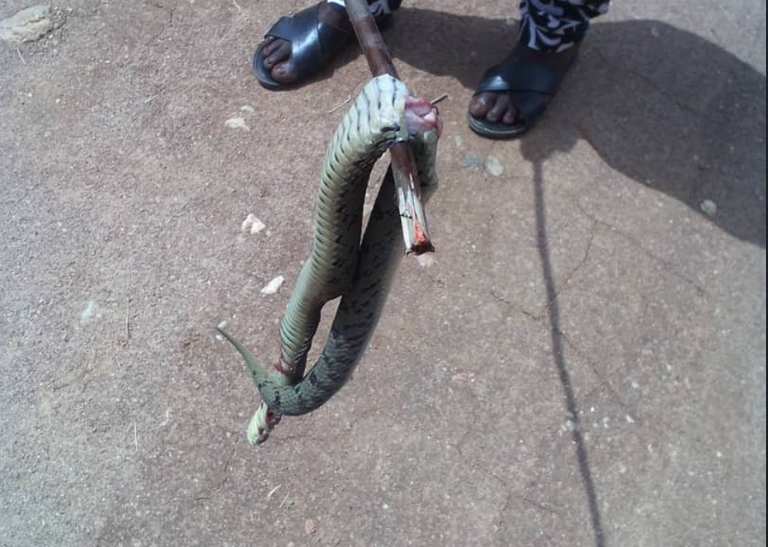I still have PTSD from a snake-bite encounter I experienced about a year ago. Even though I was not the direct victim, the brouhaha that followed the incident is enough for anyone to dread snake bites.
Don't get me wrong, it is not that I really fear snakes as such. In actual fact, I still killed one last week. Just that you don't know when things might go rough with snakes around. Especially when kids are involved just like the last time.
If everything goes as planned, I and my small family hope to relocate to a new apartment in a couple of months. This apartment is located in a newly developing area where the environment is more of vegetation than houses.
In other words, we are likely to be faced with a snake infestation. We have visited the new apartment a couple of times and each time, we either end up killing a snake or sighting one lucky enough to escape in the surroundings of the house.
I have got 2 kids that are barely 4 and 2 years old respectively. While snakes may not be of direct concern to me, it is to my kids. Snakes may not be of direct concern to me because they are usually not aggressive unless they are agitated.
Kids may not know the difference between a snake and a piece of string. Thus, how best to get rid of snakes in the surroundings has been a major concern to me.
When I said getting rid of snakes, two approaches are possible:
- Killing off snakes in the surrounding
- Put a barrier in place that will not allow snakes to get anywhere close to the surroundings of the house.
I would actually prefer the latter. Snakes are a major component of the food chain in the ecosystem. Killing them off may disrupt the food chain or food web of the ecosystem.
Also, not all snakes are dangerous, even though merely sighting them gives adrenaline. However, deciphering poisonous snakes from those that are not poisonous requires some expertise on one hand and close proximity with the reptiles on the other.
I am neither an expert nor do I want to maintain close proximity with snakes. Thus, my first reaction to sighting them is to chase them down and dealt them fatal blows with the nearest stick or any other weapon.
Since the first option is off the table, I am only left with the second option. What barrier can be put in place to ensure that snakes do not come close to the surroundings of the house? Definitely not physical barriers. Below are the potential solutions that I was able to gather:

Using Nicotiana tabacum plant
There is this general belief in my locality that snakes dislike the scent of Nicotiana tabacum plants and will usually not move anywhere close to them.
Thus, it is a common sight to see the plant around houses in my area. Growing up, I never questioned this belief, until I got educated and started making my own research. Does the plant actually chase snakes away?
Several literatures on the ethnomedicinal importance of plants actually link this plant either as snake repellent or in the potential treatment of snake bites. However, a piece of anecdotal evidence from a friend of mine says otherwise.
According to him, he has personally witnessed a snake lying calmly under the Nicotiana tabacum plant. This should not be so if the plant, indeed, repels snakes. Could literature be wrong? Perhaps not. Just that there may be a lot of intricacies involved.
Only relevant experimental tests can actually prove that the plant has the capacity to repel snakes. I was not able to find any published experiment throughout my search.
Other ethnobotanical approaches
Apart from Ticotiana tabacum, there are several other plant or plant products that have been reported to have the potential to repel snakes. The potential is either due to their scents or their morphology.
Plant products like ginger, garlic, onions, etc are known to have strong smells and have been implicated in many literatures to have the potential to repel snakes. Still, there are no experimental tests to support these assertions.
Plants with thorns or leaves with sharp edges have also been reported to be enemies of snakes. The thorn or sharp leaf edges prick the snake's skin whenever there is contact and this tends to make the reptiles move as far away as possible from such plants.
Use of chemicals
The use of chemicals may seem like the most obvious and easiest solution to keep away snakes. However, as someone who cares for biodiversity and the environment, the practice raises some concerns.
I really do not know how selective the commercially available chemicals are. Most chemicals affect organisms that are not the primary target. They also have the capacity to persist in the environment and get into food chains/webs.
Thus, the chemicals end up bioaccumulating in the body of higher animals. I really would not like my hatred for snakes to take away a few years from my life expectancy :).
Biological Control
Snakes can also be taken care of biologically by making use of their natural predators. The realistic natural predator in my own case would be chickens/hens.
Free-roaming chickens or hens are capable of killing snakes, provided they are not of considerable side. The reverse may be the case if the chickens are kept in a cage.
I have witnessed a couple of events where chickens locked up in cages end up losing their lives to snake bites. Once snakes are able to find their way into the cage, the restricted movement of the chickens makes them susceptible.
My best approach
As an environmental activist, the use of chemicals is out of the equation for me. Also, unproven methods of getting rid of snakes may come as mere experiments and if they fail, the consequences may be too costly for me.
Thus, I am left with scientifically plausible, but not necessarily proven methods. In other words, planting plant species with thorns and or sharp-edged leaves in combination with rearing chickens would be my best bet.
Local chickens are generally stronger than genetically modified breeds. So, here comes my local chickens in a couple of months.
What do you think?
###Resources


